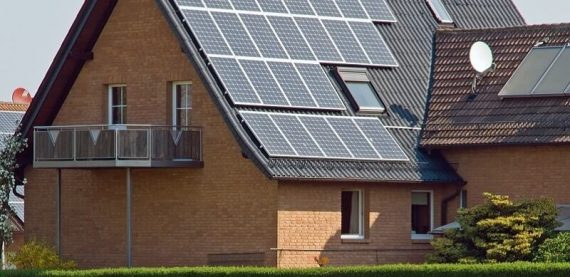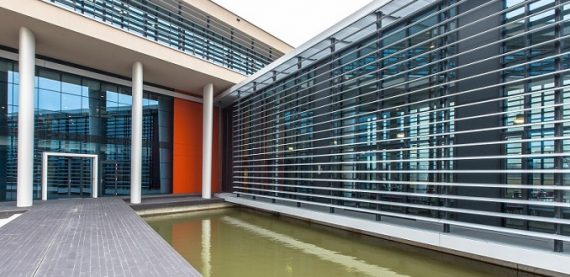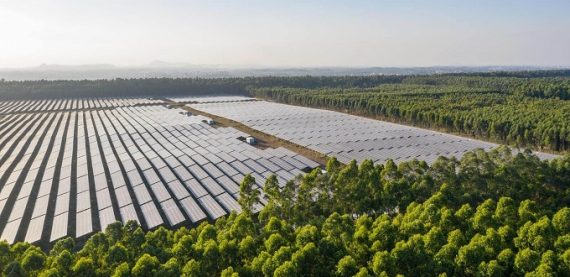Commercial Buildings
As a responsible business owner, you can help protect the environment now and for future generations by producing your own clean solar energy. Solar energy helps decrease the amount of fossil fuels we utilize, thereby decreasing pollutants causing global warming.
Commercial solar power has the potential to increase savings for businesses and building owners. Unfortunately, many business owners have not taken the time to truly study the operational and financial benefits of solar power and they see solar power as being all up-front cost with very little upside other than being “green.” To help deal with this, we have compiled the top 5 reasons for businesses to invest in commercial solar power.
- Government Incentives
Malaysian government have put in place aggressive financial incentives to help make the out-right purchase of a solar power system much easier.
For businesses that do not want to come up with a large upfront cash payment for a solar power system, customers can choose to lease solar panels for between 15-20 years
In addition, a variation on the leasing model is the power purchase agreement (“PPA”). Under the PPA model, the solar provider secures funding on their own for the solar system and then install the solar system on your building. Subsequently, the solar provider maintains and monitors the energy production from the solar system. You pay nothing for this installation and maintenance. The solar provider then sells the electricity from the installed solar system to the building owner at a fixed contractual price for the term of the contract. So, in essence, you are paying a fixed rate for the cheaper energy produced on the top of your building. In most instances, the cost of this electricity is initially about significantly lower than electricity from the utility grid and the savings usually increases over time as the rate of electricity from the grid increases due to inflation, yet with a PPA, you are locked in at a fixed rate. PPAs generally lasts between 5 and 25 years. In some renewable energy contracts, the host has the option to purchase the generating equipment from the PPA provider at the end of the term, may renew the contract with different terms, or can request that the equipment be removed.
(2) Significant Operating Advantages
There are also a number of significant operational advantages for businesses to invest in solar power.
Reduce Your Building’s Operating Costs
Installing a solar system can dramatically reduce your business’ operating expenses which can have a ripple effect throughout your company balance sheet. Regardless of whether you pay for your solar system up front or lease it, corporate utility costs will significantly decline to the point where the savings can eventually pay for the solar system.
Depending on your business model, the savings associated by investing in solar power can affect different parts of your business. For example, a commercial office building owner who relies on rent from tenants, typically has two options when dealing with high utility rates: (a) absorb these costs or (b) pass on some or all of these costs to the building tenants. There are consequences to both paths. Option (a), absorbing some or all of the energy costs of operating the building will reduce the profit margin of the building. Option (b), if energy costs are passed on to the tenants, then the building owner may wind up pricing many of the tenants out of the building and the owner might be left with vacancies and loss revenue. By reducing operating expenses with solar power, a building can avoid this (i) keep the lease rates of the tenants at a more favorable rate, (ii) keep the building at or close to 100% occupancy and (iii) maintain strong profit margins due to reduced expenses and strong revenues as a result of high occupancy.
Hedge Against Rising Utility Rates
In addition to lowering your operating expenses, solar power can help insulate a business from volatility in the power markets. Not only are their seasonal swings in utility rates due to high consumption during summer but historically electricity rates have increased on average over the years. By investing in solar power, businesses can insulate themselves from these increases by producing their own cheap electricity. And by guaranteeing themselves a certain electricity rate with solar, businesses can take the variable nature out of their utility costs and begin to categorize their utility costs as more of a fixed expense, providing for a more predictable and stable balance sheet in which to work.
(3) Low Maintenance/High Reliability
Solar energy systems from reputable solar providers require virtually no maintenance and operate with no noise. Given the roof structure of many commercial buildings, the access to structure is easy. While individual solar cells are fragile, they are encased in a highly tempered and protective glass case, which is framed by non-corrosive aluminum. Because solar panels are exposed to the elements, they are typically very sturdy and built to withstand rain, hail and other weather-related threats. In addition, the photovoltaic cells that make up the panel experience very little break down over time, similar to computer chips. Accordingly, most solar manufactures offer a full warranty over their solar panels for 20-25 years which means that once you make the move to solar, you will experience clean electricity for at least 25 years from a system that is just as functional and more reliable than standard utility electricity.
(4) Marketing Advantages
Businesses that make the decision to invest in solar power can also reap a marketing advantage.
Reputation for Quality
First, the actual decision to install solar power on your building takes time and diligence to make sure the requisite financial and operational components fit within your business model. More than anything, it represents a commitment to quality, care and operational efficiency. These are critical factors needed to acquire and retain tenants with any building project and demonstrate a corporate commitment to quality and the environment, separate from your competitors.
Media Attention
While more commercial buildings are beginning to see the virtues of going green, these types of complexes are still in the minority. By marketing your building as a green building, you raise the likelihood of media attention as you are the forefront of modern construction. What’s better, most of the time this media attention is free and helps tremendously to spread the word about your business.
Investment Advantages
One final advantage of investing in solar power relates to the possible acquisition of your commercial building. As we have shown, incorporating solar power into your commercial building can dramatically change the economic value of the building by improving vacancy rates (if applicable) as well as lowering the buildings operating expenses. These types of commercial buildings are excellent investment vehicles for real estate investment trusts or other investors who are looking for real estate with tremendous cash flow upside. By marketing solar power, you not only help the economic value of your multifamily building but also raise your profile to those investors who might be willing to pay a premium for a building that is economically and operationally efficient.
(5) Many Types of Commercial Buildings
For commercial building owners, installing solar power is an easier proposition due to the fact that commercial buildings typically can handle a larger solar system size and benefit from a lower per kilowatt-installed rate. In addition, businesses tend to stay in one building for a longer period of time than homeowners thus more completely realizing the economic benefits of solar power.
Unfortunately, many businesses do not believe or even know that solar power can help their business save money. Many see solar power as only works for high technology businesses or that solar power just would not make sense for as they run their operations throughout the night. The good news is that solar makes sense for a wide variety of businesses and buildings regardless of industry. The key factors to look for to determine whether solar power would work for your business would be (1) large electric bill due to heating water or operating machinery, (2) round the clock operations, and (3) subject to energy spikes in high intensity months. Whether you are a laundromat, data center or huge manufacturing facility, if you suffer from any or all of the above, you should consider solar power. For those businesses with high electric bills due to heating water, such as a laundromat, solar thermal power can heat water at a fraction of a cost. In addition, solar power can help offset a substantial portion of a buildings electric usage by providing power during the day when utility rates are the highest and then go back on the electric grid during the evening when rates are lower. In addition, all solar power systems come with a battery that can store any excess power produced during the day so that it can be drawn on at night. In addition, solar power can also help offset and smooth out fluctuations in electric usage during high intensity months such as the summer or winter by supplementing your power supply so that you are pulling less energy from the grid. So, whether it is a manufacturing facility or a data storage center that runs all night, provided the building has enough space to house solar panels, solar power will help can provide the necessary power to help operate a diverse range of businesses regardless of when or how they conduct their operations.
Industrial Property
In the last decade, the number of businesses going green has grown rapidly. Be it hospitals, technology firms, consultancies, government offices, non-profit organizations, manufacturing units, or consumer packaged goods industry — all are taking deliberate measures to enhance their social and environmental impact. Businesses have realized how solar arrays enable them to create community goodwill, improve their stakeholder perceptions, save power costs, and get a good return on investment.
Offset your electricity costs with solar
Generally speaking, factories and production facilities have high power requirements. With solar electric power, you can easily offset these costs. This will improve your bottom line and help you stay ahead of the competition.
Much like buying property versus renting it, buying solar and generating your own electricity eliminates the wastage of money, month after month.
Protect against power cost increases
Installing solar power system on your factory makes you a self-sufficient, energy-producing organization. This will shield you from any increases in the cost of power.
Consume free power and sell the excess
Once your solar energy system’s payback period is over, your business will start generating electricity for free. Moreover, if you have enough rooftop solar panels or ground-mounted panels, you can make money from the excess electricity generated from your solar farm. You can sell the surplus electricity back to the grid.
For businesses operating at a thin profit margin in those first critical years, initiatives like these make all the difference.
How does going solar impact your brand image?
Renewable energy solutions are on trend, and it’s high time to join the movement to save our environment. Soon enough, every industry on the planet will either go green or go under. By supporting clean and renewable energy, you tell customers that you care about more than just profits. You’ll create a positive brand image for your shareholders, your customers, as well as for your local community.
Once your flat roof solar panels are installed, take a few epic photos of your solar farm and share it with the world. Shout out loud about your commitment to a clean energy future, and spread the message to eliminate harmful greenhouse gases.
Moreover, with companies coming under fire for their unsustainable practices, you can get a step ahead of critics. You also set yourself apart from the other companies in your industry that haven’t gone green yet.
Why should factories install solar photovoltaic panels?
In addition to the numerous benefits we’ve outlined above, there are a couple of other factors that makes renewable energy a great time to invest in solar for your factory.
Solar incentives and rebates reduce installation costs
There are some attractive tax credits available for industrial factories. With multiple rebates and incentives available for commercial solar installation, the whole solar project becomes a much easier pill to swallow.
With the green tax incentives, you get to claim 50 % of the total cost and deduct it from your taxes. There are a few investments you can make today that take such a huge chunk out of your tax bill. When you choose solar power, you can claim a good share of your investment and pour it back into your business.
Solar reduces your tax liability
The maintenance fees are often able to be written off on your end of the year tax assessment as well. On top of that, the money that you won’t have to spend on utilities will seem like icing on the cake, especially when you start selling it back to the grid.
Check out how you can take advantage of the federal solar tax credit to reduce your solar costs.
Solar power makes you a socially responsible business
With the reality of climate change fast approaching, it’s vital to make conscious decisions to help keep the earth healthy while we enjoy our lives on it. If you won’t make sustainable decisions, you risk leaving behind a less interesting and less diverse planet for your children.
Industrial solar panels ensure that you’re getting the kind of return on investment that you deserve when you make responsible decisions about the planet.
Remember that it’s not just your business that can benefit from solar household but also stand to save thousands of ringgits from installing solar panels.




